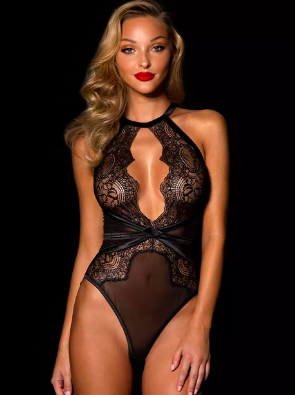Honey Birdette handed 14th ad ban of 2018 for implying model was available for ‘riding’
Infamous lingerie advertiser Honey Birdette has had its 14th ad banned this year, this time for suggesting “the model was available for sexual relations, or ‘riding'”.
The ad, which features a woman in lace lingerie reclining on a chair above the text “Take a Ride”, was banned for employing sexual appeal in a way which is exploitative of an individual.
A complaint posted to Ad Standards said the ad was “offensive” because of its placement near a cinema and children’s playground and that it commodifies women.
“This objectification and commodification of women enables a culture that promotes violence against women and inequality,” the complaint said.
Responding to this ruling, Honey Birdette said the result was astounding.
“This year we have pulled back the reins and produced our tamest campaign yet to still be sent a complaint.
“Like any other retailer located in a shopping centre thoroughfare, we have the right to display and advertise our current collections in our store front windows,” the advertiser added.
At the same time, the lingerie brand had another ad banned for not treating the issue of sex, sexuality or nudity with sensitivity.
The complaint said the ad features “half a woman’s genitals” shown across a shop front.
“It’s borderline porn. I don’t believe it’s appropriate for my children to be within sight of this so I have to make sure I avoid that place,” the complaint continued.
The ad in question was banned by Ad Standards, as the woman’s pubic region only had sheer material covering it.
“We have purposefully edited our imagery to remove any nudity that would be considered offensive, and with the great respect we as a brand have for our models, would never put anybody’s ‘genitals’ on display. This is not what Honey Birdette stands for,” Honey Birdette said.
This year alone Honey Birdette has been banned for having an in-store poster which was deemed too sexy and subsequently “confronting”, not treating the issue of sex, sexuality and nudity with sensitivity, a campaign which was sexual and violent in nature, an ad which failed to censure a woman’s nipples, posters which were deemed to be “soft-porn” and an ad which was considered as “sexually suggestive”.




And here’s the latest from the easily offended and PC world we now live in…
What do you mean ‘now live in’? When in Australia’s history could Honey Birdette’s ads have appeared in shopping centres and NOT got complaints?
Well done Honey Birdette for:
A. Offending 2 or 3 prudish mothers per month on their 10am stroll through the local shopping centre
B. Managing to average more than one complaint per month in 2018
C. Most importantly – supplying Mumbrella with a years worth of consistent, monthly content. What would adland be with out these updates?!
Next up: Wicked Campers manages to sneak in one more Yuletide discrepancy before NYE
OK. First Up. Trigger warning.
For safety’s sake, kindly have comfort puppies close at hand.
Don’t ever watch the early James Bond movie ‘Goldfinger’.
In an early scene Bond is introduced getting a poolside massage from a pretty swimsuit wearing blonde named, “Dink”.
As in – now readers were warned – double entendre for she will give you a … as Bart Simpson says, “the rest writes itself”.
Later, the beautiful and talented Honor Blackman introduces herself to Bond, who is coming out of mickey-finn induced stupor as, “Pussy Galore”.
At least Bond replies groggily, “I must be dreaming”.
Can you bring a class action, today, for being offended from a movie produced when JFK was president?
Very easy to segment the parents from the non-parents from these comments
Leon, you are a true intellectual.
Dear Abigail,
She’s on a sleigh – hence ride.
To say our beautiful model’s genitals are ‘half hanging out’ is a disgrace to women.
You should be ashamed of yourself.
Eloise – owner and creator of something far more fabulous than your passion for click bait.
Happy holidays xx
Eloise from HB
Hi Eloise,
Thank you for your comment and taking the time to read the article. The comments I was referring to was in relation to the complaint posted to Ad Standards, not my personal opinion or thoughts on the advertisement.
Cheers,
Abigail – Mumbrella
You have a responsibility to facts not trash. Everyday I love seeing smiles. You love seeing click bait. Let that go. Life will be better
Keep up the great work Eloise. Even boring old Abigail loves it, even if she won’t admit it.
Hmmmm…
Imagine how risqué the word ‘ride’ would be if the sleigh was also not visible in this shot…
https://www.instagram.com/p/Bpfow_BAYC9/?utm_source=ig_web_copy_link
Is it 2018 or 1918? I personally don’t see a problem with it. All power to those who love to complain about nothing….
When men can be displayed half naked on Bonds and Calvin Kien completely naked holding their crotch but a woman sitting on a chair is inviting violence???
There’s definitely inequality in the air but it’s not coming from Honey Birdette my love.
Thanks Abigail for reinforcing the double standards that is in today’s society
Women supporting women is what is needed and you use your platform to spread and enforce sexiest outdated values
Congratulations .
At this point you’re just using the company’s name for traffic. Report actual news.
I’m confused on what’s wrong with it ..
Good thing our children don’t see us in less at home or the beach or talk to us during showers/toilet breaks.
It’s insane. Kids can’t see lingerie posters that are being displayed by a store selling them? They are going to be in for such a shock when they grow and realise what was needed for them to be here if we should be sheltering them THAT much.?
I’ll happily continue taking my children (female and male) into Honey Birdette. They don’t walk in there and see issues they see lingerie which they see their Mum in less when they don’t give me any privacy.
Down with sexism!
– outraged fat white male
I’m sick of these snowflakes getting offended by the smallest things. It’s a lingerie advert what do people expect? It’s not porn and no she doesn’t have ‘half her genitalia showing’. Embarrassing.
There’s a lot to say about both this article and complaint, but ultimately there’s nothing wrong with the advert. There are no genitals on display and it’s quite laughable to even suggest so, last time I checked the bikini line is not genitals by anatomical standards. What’s more, that area is covered.
There’s nothing harmful to children about these adverts, you don’t see me abstaining from walking past Agent Provocateur just because I have kids in tow.